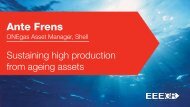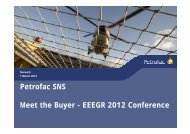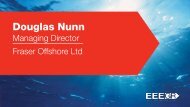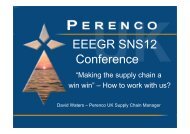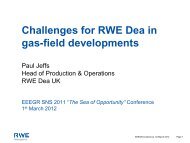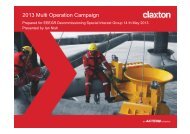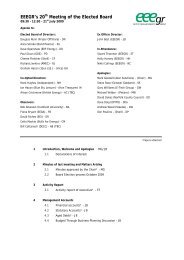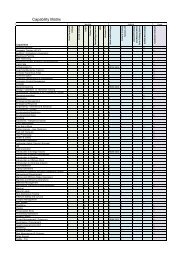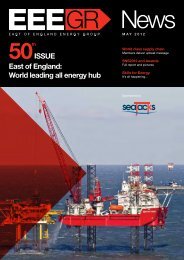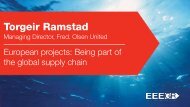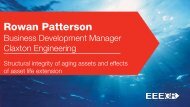Ian Moulton, Perenco
Ian Moulton, Perenco
Ian Moulton, Perenco
- No tags were found...
You also want an ePaper? Increase the reach of your titles
YUMPU automatically turns print PDFs into web optimized ePapers that Google loves.
<strong>Perenco</strong> UK Ltd.<strong>Ian</strong> <strong>Moulton</strong>Operations Improvement Manager
Company history and strategy• Independent Global Oil & Gas Exploration & Productioncompany• Founded in 1975 by Hubert Perrodo• Still family owned, chairman François Perrodo• Global onshore and offshore operations• Worldwide operations in the U.K., Turkey, Tunisia,Egypt, West Africa, Gabon, Cameroon, Congo, D.R.C.,Colombia, Guatemala, Ecuador, Peru and Venezuela,Vietnam, with exploration rights in Iraq, Australia andBrazil• Growth strategy:– Maximise recovery and production potential from mature fields
How did I get started in the industry ?I had friends who had already left the RAF and were working in the industry and theyput me in touch with my first employer.I didn’t prepare for the Oil and Gas sector before I left the RAF but thought I wouldbe able progress within the industry based on my service experience.I did but I was lucky, the sooner you can start the preparation the better.It’s important that you take advantage of all the services and training available to youbefore you leave if possible. This may be via the military or via externalorganisations like EEEGR
Core Oil & Gas SkillsThe core skills of any operation are:MechanicalInstrumentsElectricalOperations
Core Oil & Gas SkillsBehind those skills are:TelecommsEngineering support for all the core skillsProjects which includes all disciplinesFabric maintenanceMeteringCrane OperatorsITCommercialDocument controlCAD operatorsAccountsLogisticsAdminHSEIntegrityPlanningSupply chain
• Leman 49/27 AlphaCompression Hubs
Mechanical
Instruments
Electrical
Having seen some of the typical equipment used offshore you may think that you don’thave the experience for this industry and if you are just comparing your current job withthe Oil & Gas industry you might be right but I suggest you will be selling yourself short.The equipment used offshore or at a terminal may be bigger or used differently but thebasic trade principles you have been taught hold true for all the items shown regardlessof its size.You all have sound trade training which is one of your key attributes.Some of your others are;ReliabilityAdaptabilityFlexibilityCommitmentResilienceHumour
What kind of preparation do I need ?Spend quality time getting your CV right, it is your personal advertisement.The first pass of a CV from a prospective employer is normally completed in less than aminute. You might not get a job in that minute but you can lose one.Try to make the CV job application specific.Do not over use acronyms, if they are only used in the military avoid them or at leastexplain them.Expand your technical knowledge if possible, the military can be quite focussed. There aremany civilian equivalents with respect to systems and processes you just need to identifythem.In preparation for an interview Google ‘Key Offshore legislation’What to avoidSpecific offshore training as part of any resettlement.MIST, Survival, Fire fighting etcSome people may try to convince you that you wont get a job offshore without them butany credible E&P company will provide you with the specific training you will require.
• Any Questions?
Charlie MorrisProject Manager – TurbinesRES Offshore
John WardenSector Manager NuclearECITB
Question & AnswerSession
Lunch andNetworking
Kip MortonBusiness Development ConsultantTurbine Efficiency
Mark GoodacreOperations TechnicianShell
CV Workshop



